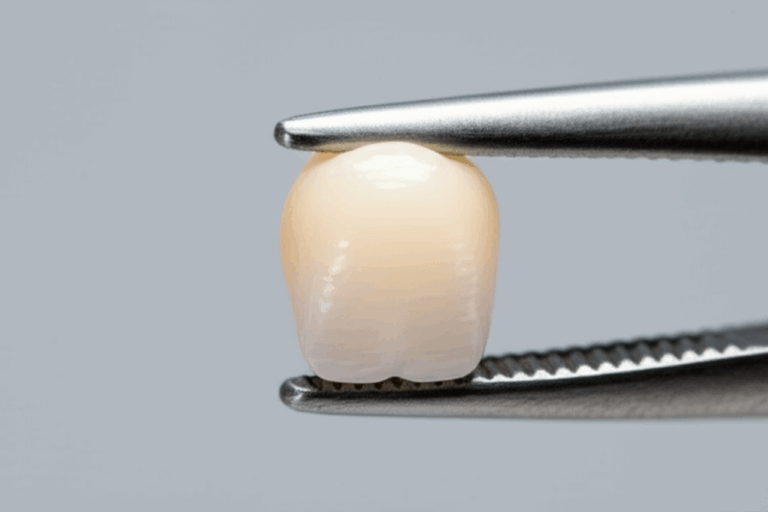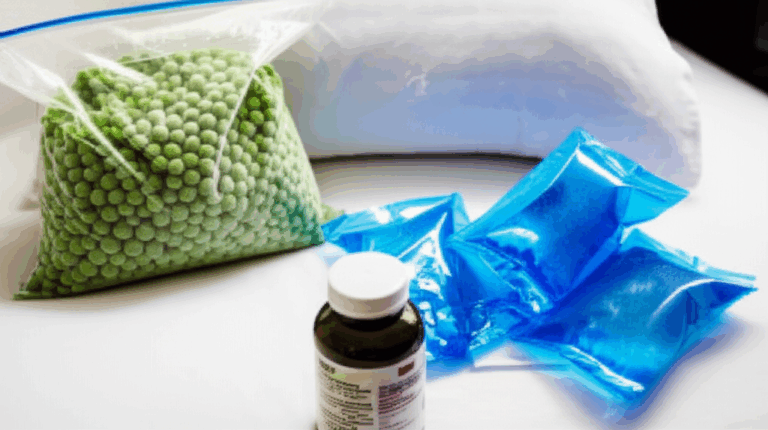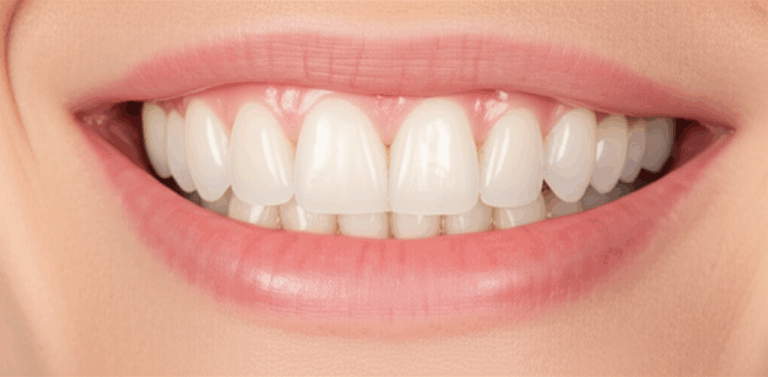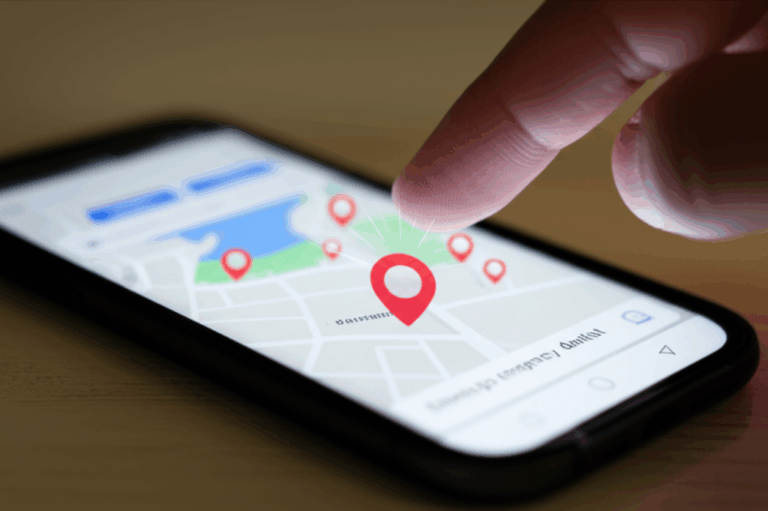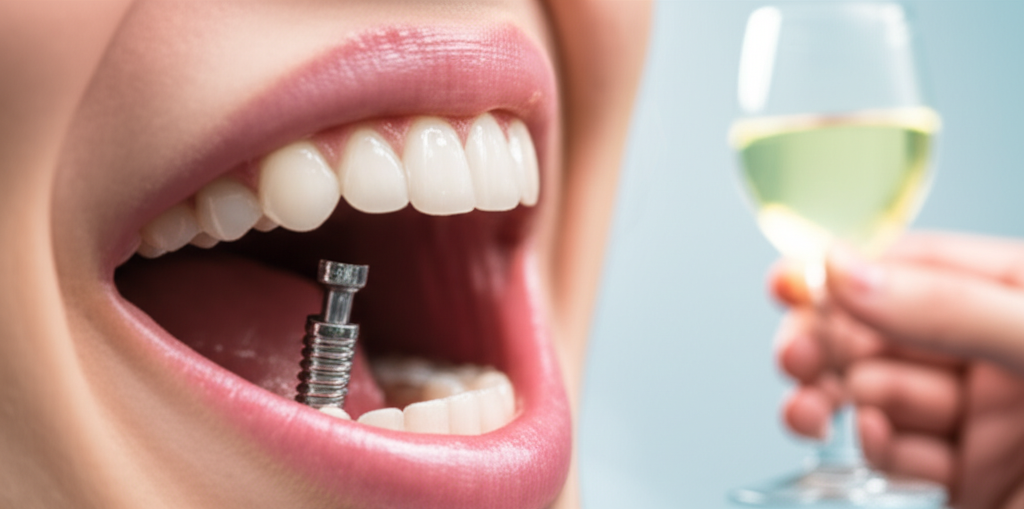
When Can I Drink Alcohol After a Dental Implant? Your Expert Recovery Guide
That first glass of wine or a toast after getting a dental implant might sound like a great idea—especially if you just finished surgery and want to feel normal again. If you’re searching, “How soon after a dental implant can I drink alcohol?” you’re not alone. This is something a lot of people ask their dentist after surgery. It’s perfectly natural to want to go back to your old habits, but your mouth is trying to heal, and what you put in it is very important.
The good news is that with a bit of patience and the right care, you’ll be able to enjoy a drink before long. But first, let’s talk about why waiting is important, what’s really going on in your mouth after an implant, and how to make your recovery as easy and fast as possible.
In This Article
- The Short Answer: Why You MUST Wait (General Timeline)
- The Critical First 24-72 Hours: Zero Alcohol Zone
- Medication Interactions
- More Bleeding & Harder Clotting
- Dry Mouth & Dehydration
- Bad Judgment & Nausea
- The First Week & Beyond: Keep Being Careful
- Bone Healing Trouble (Osseointegration)
- Risk of Infection
- Slow Wound Healing
- Suture Care
- When is it Actually Safe to Drink Alcohol After an Implant?
- Long-Term Problems from Drinking Too Soon
- Tips for a Smooth Dental Implant Recovery (Not Just about Alcohol)
- Conclusion: Put Your Healing First
The Short Answer: Why You MUST Wait (General Timeline)
Let’s get straight to it—you should not drink any alcohol for at least 48 to 72 hours after getting a dental implant. A lot of dentists say you should wait a whole week or even longer, especially if you’re taking medicines like antibiotics or painkillers. Why? Right now, your mouth is under repair, and alcohol messes up the healing process.
The first three days are the most important. Even after that, alcohol can slow down healing and cause more problems. All dentists agree: Listen to your own surgeon’s advice. Everyone is different, and so are their implants and medicines. Grab a drink too soon, and you could end up with a slow healing mouth, infection, or even a failed implant.
Quick Recap:
- Do NOT drink any alcohol for 48-72 hours minimum.
- It’s best to wait 5-7 days, or until you are done with all medicines and your dentist says you can have alcohol.
- Always ask your dental team for advice just for you.
The Critical First 24-72 Hours: Zero Alcohol Zone
Think of the first three days after your implant as an extra-fragile time for your mouth. Just don’t drink alcohol—here’s why.
Medication Interactions
Most people leave dental implant surgery with a bag of medicines: antibiotics, pain pills, and maybe something to help with nerves. Here’s what happens if you mix these with alcohol:
- Painkillers (NSAIDs, opioids): Alcohol and painkillers together can make you super sleepy, hurt your liver, and sometimes even cause serious medical problems.
- Antibiotics (like Metronidazole): Mixing some antibiotics and alcohol can make you throw up, feel dizzy, or get a wicked headache—this happens more often than you’d think.
- Sedatives: If your dentist gave you medicine to relax for your surgery, alcohol can make you feel even more tired and slow your reactions.
So, one more good reason not to drink: alcohol can make your medicines work worse and lead to health risks.
More Bleeding & Harder Clotting
Right after surgery, your mouth needs to make a blood clot where the implant is. Alcohol opens up your blood vessels, so you bleed more and it’s harder for the clot to stay put.
Think of healing like building a bridge. Too much bleeding is like a flood washing the bridge away. Not worth it!
Dry Mouth & Dehydration
Alcohol makes you pee more, which dries out your body and mouth. Your healing cells need water to work right. A dry mouth is also more likely to get infected because germs love that kind of place.
Bad Judgment & Nausea
During those first days, even a little alcohol can make you clumsy or forgetful. One small accident, like bumping your mouth or biting the sore spot, can slow your healing or hurt the surgery area. Why take the risk?
Plus, alcohol can make any post-surgery nausea worse, which many people already get from painkillers or antibiotics. No one wants to throw up with new stitches in their mouth.
The First Week & Beyond: Keep Being Careful
After the first 72 hours, you still shouldn’t run for a drink. Your implant is still getting attached to your jaw—a process called osseointegration.
Bone Healing Trouble (Osseointegration)
Osseointegration is when your implant fuses with your jawbone. Imagine it like cement drying between bricks—if you mess it up too early, the whole thing can go wrong.
- Alcohol slows bone healing: Studies show alcohol can cut off blood supply, stop bone from growing, and keep your body from sending help to the area.
- The result? Your implant might end up loose or not attach at all.
Risk of Infection
Your body’s defense system is busy fighting off bacteria after surgery. Alcohol gets in the way and makes your body weaker at fighting germs.
Picture your immune system like a security team. Alcohol sends half the team home—and you really don’t want to get an infection while you’re healing.
Slow Wound Healing
Alcohol doesn’t just hurt bone—it makes gums heal slower, too. Your gums need good blood flow and new cells, but alcohol makes both harder. That can mean more soreness and problems with the gum closing up around your implant.
Suture Care
If you have stitches in your mouth, don’t drink alcohol until they’re gone or dissolved. Alcohol can irritate the area and might even ruin the stitches faster. Give it time.
When is it Actually Safe to Drink Alcohol After an Implant?
You got through the hardest days, your swelling is better, and your checkup is coming up—so can you have a drink now?
Ask Your Dentist or Oral Surgeon
Every person and every dental implant is different. The surgery style, your health, your medicines, and how you heal all matter. Your dentist’s advice is the most important—don’t guess!
General Guidelines
Most dentists say:
- Minimum: Wait at least 5-7 days after your surgery. Some dentists say to wait longer.
- Best: Wait until you’re done with all antibiotics and painkillers and your dentist checks that you’re healing well.
- First Drink: If you do have alcohol later, keep it small and watch how your mouth feels. If you get pain, swelling, or any new problems, stop and call the dental office.
Have a big event coming up? Let your dental team know—they can help you plan.
Long-Term Problems from Drinking Too Soon
Bottom line: be patient. Rushing recovery could lead to bigger problems later, including:
- Slower healing: You might need more time to feel better.
- More pain, swelling, and bruises: Alcohol can make these worse.
- Infection: It’s easier to get a mouth infection after drinking too soon.
- Implant failure: Worst case—the bone doesn’t heal, you get an infection, and you could lose your new tooth.
You spent a lot for your dental implant—don’t undo the benefits by taking chances during recovery.
Tips for a Smooth Dental Implant Recovery (Not Just about Alcohol)
Alcohol isn’t the only thing to avoid. Here’s what will help your recovery and keep your implant strong for years:
Follow Your Dentist’s Instructions:
Read whatever sheets or emails they gave you. If it says “no straws,” “avoid hot foods,” or “rinse with salt water,” just do it—these tips matter.
Easy Brushing:
- Use a soft toothbrush around the new implant.
- Salt water rinses are great to keep your mouth clean.
- Skip strong mouthwashes with alcohol in them.
Soft Foods Only:
Eat things like yogurt, eggs, mashed potatoes, or soft soups. Hard foods can hurt the new implant.
No Smoking at All:
Smoking is even worse than alcohol for new implants. It slows healing, raises infection risk, and can make your implant fail.
Get Lots of Rest:
Healing takes time and sleep. The better you rest, the faster you’ll get back to normal.
Drink Plenty (Not Alcohol!):
Water, mild teas, or clear soups keep your mouth moist and help your body heal.
Don’t miss your checkups:
Go back for your follow-up visits—they’ll spot problems early.
Who Is This Advice For?
Are you thinking about getting a dental implant, just got one, or helping someone recover? All this advice applies if you have one implant, a few, or big surgeries like bone grafts or sinus lifts. Even implant dental laboratory work needs good aftercare for your teeth to last.
If you have diabetes, problems fighting infections, heal slowly, or smoke, your “no alcohol” time might be even longer. Always ask your dentist what’s right for you.
Your Healthy Takeaway (The Empowering Conclusion)
Dental implants are a big step for your smile and well-being. What you do in the first days and weeks—including avoiding alcohol—can make a huge difference for many years.
Key Points:
- Wait at least 48-72 hours, but most dentists say 5-7 days or more before any alcohol.
- Never mix alcohol with dental medicines like antibiotics or painkillers.
- Alcohol makes healing slower and raises risks—bleeding, pain, infection, even failed implants.
- Soft foods, gentle cleaning, sleep, and water are your best tools.
- When in doubt, call your dentist!
Want a safe recovery? Wait for the green light before you drink. Your future self—and your smile—will be glad you did.
Looking for more? See how china dental lab technology is making implants better, or learn more about implant cost. If you’re on the hunt for the right implant dentist, take your time and choose carefully.
Reach out to your dental team with questions, follow their recovery plan, and treat your new implant right. Cheers—just wait a little longer!
FAQs: Alcohol and Dental Implant Recovery
Can I have a small glass of wine a few days after my implant?
Nope. Even a little alcohol can slow down healing, especially if you’re still taking any medicines.
Will alcohol always cause implant problems?
Not always, but it does raise the risk. Some people get lucky, but do you want to gamble with your new smile?
What if I accidentally drank alcohol before remembering these guidelines?
Don’t panic. Tell your dentist, keep an eye out for extra bleeding, swelling, or pain, and follow their advice.
Best tip: Spend the first few days on getting better, not celebrating. If you aren’t sure or want to talk, your dental team is ready to help. Remember, good communication and patience lead to the best results!

